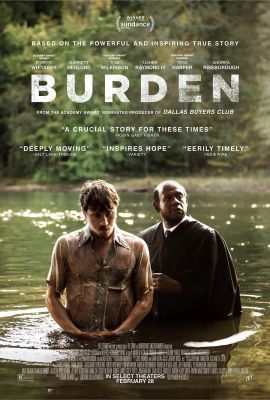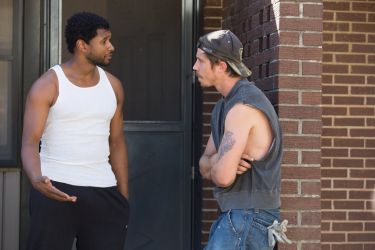Burden (2018)
Burden is a American drama movie, Inspired by the real-life story of Mike Burden who released on February 28, 2020 (United States). Directed and written by Andrew Heckler this movie tells the story of a white man who raised by The klan and attempt to quit the Klan in 1996 ignited one of the strangest real-estate lawsuits in modern history between Wilkinson’s Fagen-eqsue Tom Griffin, the operator of the Redneck KKK Museum, and a local reverend named Kennedy (Forest Whitaker). It starring
- Garrett Hedlund as Mike Burden
- Forest Whitaker as Reverend David Kennedy
- Andrea Riseborough as Judy
- Tom Wilkinson as Tom Griffin
- Usher as Clarence Brooks
Plot
Mike Burden, a young man in a small South Carolina town who was raised by a KKK leader named Tom Griffin in a culture of hate and abuse (Tom Wilkinson). Griffin and his group of easily exploited yes-boys are opening the Redneck KKK Museum in an old theater when "Burden" begins, which throws the neighborhood into an outrage and turns the fire under under always-simmering racial tensions. Reverend Kennedy (Forest Whitaker) is uniting his congregation against the change, but he is preaching compassion and understanding, even to your enemies.
While this is happening all over town, a love story is growing between Mike and a single mother named Judy (Andrea Riseborough), who also happens to be friends with one of Burden's childhood pals, Clarence (Usher Raymond). Judy is startled when she realizes that Mike is participated with the KKK, and that Riseborough is very good at these early scenes of confusion. She conveys a lot of conflict without much melodrama, capturing the difficult decision of a woman who finally finds what she thinks is a respectable, supportive man, only to learn that he is a virulent racist. And she's starting to chip away at his beliefs, challenging Tom's teachings, until the dam breaks.[1]
Pros
The film shows an African-American husband, father, or pastor allowing a KKK member with a history of violent assaults against black people to stay at his home, eat with his family, and even sleep in his son's bed rather than letting him out there when his former KKK members let him and his girlfriend Judy with her young son to homelessness and hunger because he choose to leave the KKK group. It depicts how love can overcome racism and hate can not drive out hate.[2] The reverend even trying to convice his family to open their hearts to men like Mike who was white suprematic, racist and brutal. Because he believes love and peace can overcome racism[3]

